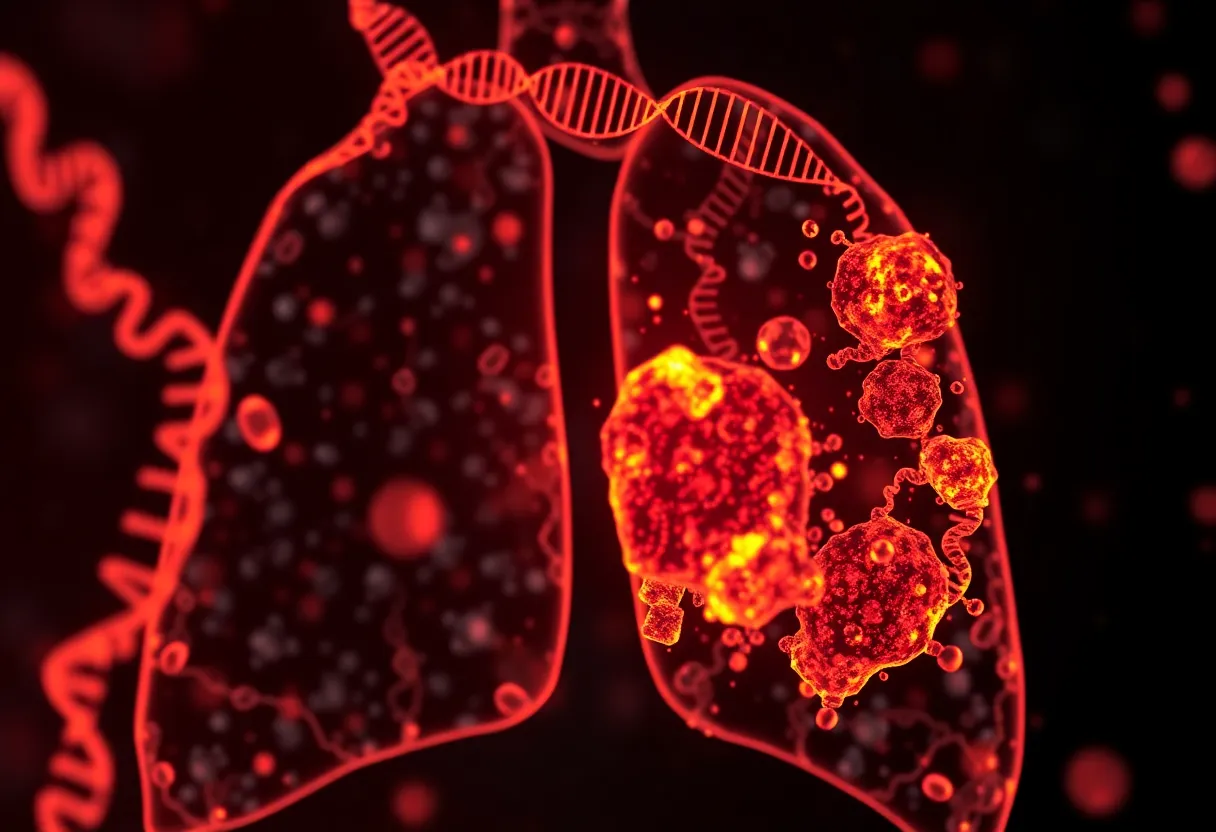News Summary
Scientists have discovered gene changes linked to asbestos-related mesothelioma, potentially leading to early detection and targeted treatments.
Revolutionary Breakthrough: Gene Changes Linked to Asbestos-Induced Mesothelioma Uncovered
In a striking advancement in cancer research, scientists have identified specific gene changes associated with asbestos-related malignant pleural mesothelioma, unveiling new possibilities for early detection of this devastating disease. Malignant pleural mesothelioma is a rare but aggressive cancer that primarily affects the lining of the lungs, often diagnosed at late stages when treatment options remain limited. The connection between asbestos exposure and mesothelioma has long been established, yet the underlying mechanisms for how this exposure triggers cancer remain largely ambiguous.
Unpacking the Genetic Puzzle
A recent collaborative study conducted by researchers from Temple University in the U.S. and the University of Siena in Italy set out to investigate the genetic behavior of individuals suffering from asbestos-induced mesothelioma. Using advanced RNA sequencing techniques, the study analyzed which genes show activation or suppression in mesothelioma patients compared to healthy individuals. This exhaustive analysis has shed light on numerous genes that behave differently in patients afflicted with mesothelioma.
Among the findings, scientists pinpointed specific gene alterations that play a critical role in how cells manage stress and regulate ions—essential functions for cell survivability. These gene changes can trigger significant cellular degradation, particularly when asbestos fibers are inhaled and become trapped in lung tissue. The chronic presence of asbestos can lead to severe cellular damage, paving the way for uncontrolled growth that ultimately culminates in the development of cancer.
A New Era for Early Detection
The profound implications of this research extend far beyond the laboratory. Understanding these genetic changes could usher in an era of early detection for mesothelioma, a disease frequently diagnosed decades after initial asbestos exposure, which complicates treatment prospects. The findings indicate that it may be possible to formulate gene-based tests to monitor risks in individuals who have been exposed to asbestos, potentially catching the disease at a more manageable stage.
Targeting Asbestos-Related Cancers
In addition to improving early detection, the research lays the groundwork for developing targeted therapies aimed specifically at asbestos-related cancers. By honing in on the genetic aspects affected by asbestos exposure, future drug therapies could exploit vulnerabilities inherent in cancer cells, thereby reducing the adverse side effects typically associated with more generalized cancer treatments. This opens up the exciting prospect of personalizing treatment plans tailored to the genetic profiles of individual patients.
The Ongoing Challenge of Mesothelioma
Despite a notable decline in the use of asbestos, new cases of mesothelioma continue to emerge due to the disease’s lengthy latency period. The occurrence of these new cases highlights the ongoing need for advancements in diagnostic, monitoring, and treatment strategies to combat this relentless disease. With the world becoming increasingly aware of the historical impact of asbestos—especially among vulnerable occupational cohorts like construction workers and shipyard employees—this research is more crucial than ever.
Hope for Patients and Future Directions
The findings contribute significantly to the growing body of knowledge aimed at enhancing the quality of life for individuals battling mesothelioma. As researchers delve further into the genetic effects of asbestos on cells, promising developments could emerge, paving the way for more effective treatment modalities and ultimately improving patient outcomes.
As the scientific community assesses these groundbreaking discoveries, hope grows for better early detection methods, personalized treatment strategies, and improved overall health for those facing the daunting diagnosis of mesothelioma.
Deeper Dive: News & Info About This Topic
HERE Resources
Asbestos and Lead Cleanup Underway at Great Falls National Park
Trumbull Center Asbestos Update: Community Concerns Alleviated
Asbestos Concerns Stir Up Action in Surry County Schools
Construction Workers Face Asbestos and Mental Health Crises
Uncovering the Tragic Case of Mesothelioma: A Family’s Fight for Justice
Asbestos Dangers Resurface at Kings County Memorial Hospital
Service King of St. George Launches 24/7 Emergency Restoration Services
Uncovering a Legacy of Death: The Asbestos Story
Asbestos Scare at Cayuga County Office Building: New Tests Reveal Contamination
Wheeling Initiates Asbestos Abatement in Historic School
Additional Resources
- Sokolove Law: Mesothelioma Lawsuit
- Wikipedia: Mesothelioma
- Legal Reader: Study Links Gene Changes to Asbestos Cancer
- Google Search: Asbestos Mesothelioma
- Asbestos.com: State of Mesothelioma
- Google Scholar: Mesothelioma Research
- Mesothelioma Guide: Asbestos Clinic in Libby, Montana Closes
- Encyclopedia Britannica: Asbestos



















